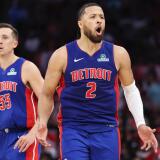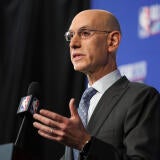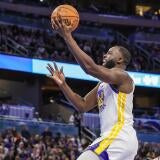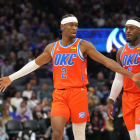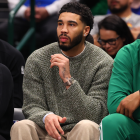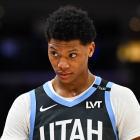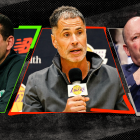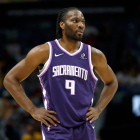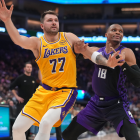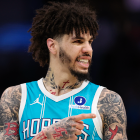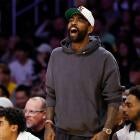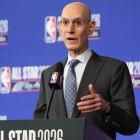2024 NBA Draft: Five teams most likely to make trades as class adds plenty of uncertainty
This two-night draft should be full of trades

A typical NBA Draft includes a reasonable number of trades, but the clearly tiered nature of most classes creates limits. The No. 1 pick is practically never on the table, for instance, because the top prospect is usually such a sure thing that the team making it would never trade it for anything. There was no universe in which San Antonio would have fielded offers for Victor Wembanyama. There can be movement within tiers. There can even be drastic prices paid to jump up tiers. However, that separation created firm lines that dictated how the trade market formed.
But this year? All bets are off. There are no sure things anywhere. The board is entirely a matter of preference. A team picking at 15 might be able to get its guy by moving down to 25... or it might need to move into the top five. There is no sense of order guiding this year's class. Nobody knows who anybody likes. No pick is so valuable that it is unobtainable to the majority of the league through trades.
Therefore, it stands to reason that this year's draft is going to include a whole bunch of trades (and they will follow the biggest blockbuster of the offseason so far as Mikal Bridges was reeled in by the Knicks on Tuesday night) Here are five teams to watch on the trade market when draft night arrives.
1. Houston Rockets
The Rockets obviously didn't mind jumping up to No. 3 in the lottery, but it wasn't a jump that really benefitted them much in pure draft terms. This is a star-less draft and Houston's only need is a star. That's it. There's not some positional hole that they need to fill. They can't take one of the top centers because Alperen Sengun already occupies that position and won't be able to function with a non-shooting big man next to him. Dillon Brooks, Jabari Smith, Cam Whitmore and Tari Eason are entrenched at forward. Fred VanVleet and Jalen Green are the back-court starters. Amen Thompson is ready to take over for VanVleet when he reaches free agency in a year or two.
They have good players or good prospects everywhere. They don't need more of them. They need to consolidate for a star. The only top prospect that makes any sense for them is Reed Sheppard under the logic that you can never have enough shooting, but even he doesn't have an easy path to a starting job available. This pick just holds significantly less value to Houston than it does most other teams picking at No. 3.
There is, fortunately, plenty of trade-up interest. There are teams that want to get to No. 3 for Sheppard. There are teams that want to get there for Donovan Clingan. If either of the top French prospects falls, they'll attract interest as well. This is going to be an asset play for Houston. Either the Rockets should use No. 3 in a star package or they should use it to trade for future picks to maximize future blockbuster flexibility. Nobody in this class makes much sense for them as an actual top-three pick.
2. Oklahoma City Thunder
The Thunder wanted Ousmane Dieng in 2022, so they offered three first-round picks to go up and get him. They wanted Cason Wallace a year ago so they took on the Davis Bertans contract to move up two spots and secure his services.
This is the benefit of Oklahoma City's slow-burn rebuild. The Thunder are not rushing to package their picks for a star. They've accumulated so many of them and so much cap flexibility that they essentially have the freedom to go and get any player or prospect that they want. Frankly, they almost have to package those picks to move up. They don't have the minutes to use all of their picks. They only have No. 12 this year, but have so many future picks burning a hole in their pocket that it only makes sense to use them to jump up for whoever they deem a premium prospect rather than adding someone at No. 12 that they might not have a use for.
Oklahoma City and Houston, for example, are natural trading partners. The Thunder are looking for a bulkier center at a reasonable price. That screams Clingan. Houston owes swap rights on its 2025 pick to the Thunder as well as its 2026 pick outright, and the Rockets, for a variety of reasons, would probably love one or both of those picks back. Some deals center around No. 12, and a future Rockets pick for No. 3 is an easy win for both sides.
3. Memphis Grizzlies
The Grizzlies are a version of the Rockets that's a bit further along in their contention journey. They don't need stars, but they don't really have many holes either. Just drafting an upside developmental prospect doesn't make too much sense for them. They saw this with Ziaire Williams. They're trying to win right now. Developing players like that under those circumstances are pretty difficult. They've had much more success with prospects like Desmond Bane, who was ready right away.
The difference is that Memphis has a clear need at center. Somebody needs to replace Steven Adams even if Jaren Jackson Jr. is going to play more minutes and possibly close games as a five. This draft pick, either in itself or through a trade, is their best chance at filling that need without blowing up their balance sheet. A trade up for Clingan is an obvious fit here. Don't rule out Walker Kessler of the Utah Jazz, who is reportedly available. He's more proven than Clingan, would likely cost less to trade for and still has two years left on his cheap rookie deal. Memphis isn't finding a playoff-ready big at No. 9. The Grizzlies either have to move up or move the pick for a proven commodity.
4. San Antonio Spurs
The Spurs are in a somewhat similar position to the Thunder, albeit without quite as much talent already on the roster. They have the assets to go get almost anybody that they want. The immediate difference is that they have two top-eight picks and the Thunder have none. If Oklahoma City wants to take a longer-term prospect that won't play at all next year, that's viable. But the Spurs? They probably need to take a step of some sort, and that could mean any number of things.
Could they offer those picks for the right veteran? Sure. Could they package those picks to try to move up to No. 1 to get a true running mate for Victor Wembanyama? Also possible. Could they keep one pick and move the other? Again, sure. It's San Antonio's pure optionality here that makes a trade so likely. They have two picks that other teams are going to want. They have the cap space to make almost any deal financially viable. And aside from Wembanyama and Devin Vassell, they don't really have core players that they are committed to. When you combine assets, needs and cap space, you have a pretty strong recipe for a trade of some sort.
5. Phoenix Suns
The first four teams were relatively young and positioned to compete either now or in the next few years. The Suns are fairly old and their contention window might already be closed. If it's not, it will likely be because of a draft night trade. The Suns have No. 22 available to offer. They could dangle their 2031 pick as well if they wait until July. They probably aren't breaking up their big three. Grayson Allen isn't trade-eligible because he just extended. The second apron will prevent the Suns from aggregating salary.
So basically, it comes down to this: can Phoenix trade Jusuf Nurkic and either one or two first-round picks for a player who is good enough to turn a disappointing 47-win first-round loser into a bonafide contender? I'm dubious. That team has more holes than one trade can fill. But Phoenix has been by far the most aggressive team in the NBA since Mat Ishbia took over. The Suns are going to try. Only time will tell if they can actually succeed.


